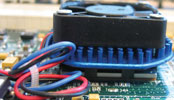

In a development that will enable entities such as companies or banks to securely encrypt their communications with data transmission that is absolutely impervious to interception, several partners have demonstrated the first quantum cryptography network in the world as part of the research project SECOQC.
The network combines seven high-security links on the basis of quantum cryptography, which is impervious to physical attack, and connects various Siemens locations in Austria. Siemens also worked on the integration of the system and developed solutions for administering and monitoring the network, and is participating in the development of a quantum cryptography chip.
Quantum cryptography operates with photons, the carriers of light. Because of the special features of quantum physics, the researchers involved, among them the famous scientist Anton Zeilinger, can use the photons to generate identical keys between two partners for secure transmission of data. Since any measurement of a photon leaves clear traces, an eavesdropper would be detected immediately. This results from a fundamental principle of the complex world of quantum mechanics according to which a measured value is changed by the measurement itself.
In practice, the data transmission requires a quantum cryptography network. Without the network, the distances between the partners are limited, because photons cannot be transmitted arbitrarily far. The network passes the keys onward; in the experiment in Vienna, at any rate, it conveyed them over 85 kilometres. The scientists carried out a telephone conversation over the network, and the data was sent via optical fibres after having been encrypted securely with quantum cryptography.
The fibre-optic network was supplied by Siemens. The developers of Siemens IT Solutions and Services provided for the system integration and the requirements analysis in collaboration with the Austrian Research Centre. In this context, Siemens first analysed possible system architectures, identified and defined interfaces, and attended to the integration of quantum cryptography distribution systems.
Siemens has been looking at quantum cryptography for a number of years now. In the framework of this research, the chip was developed together with the Austrian Research Center and the University of Graz.
For more information contact Sithembile Mokaeane, Siemens Corporate Communications, +27 (0)11 652 2000.

© Technews Publishing (Pty) Ltd. | All Rights Reserved.